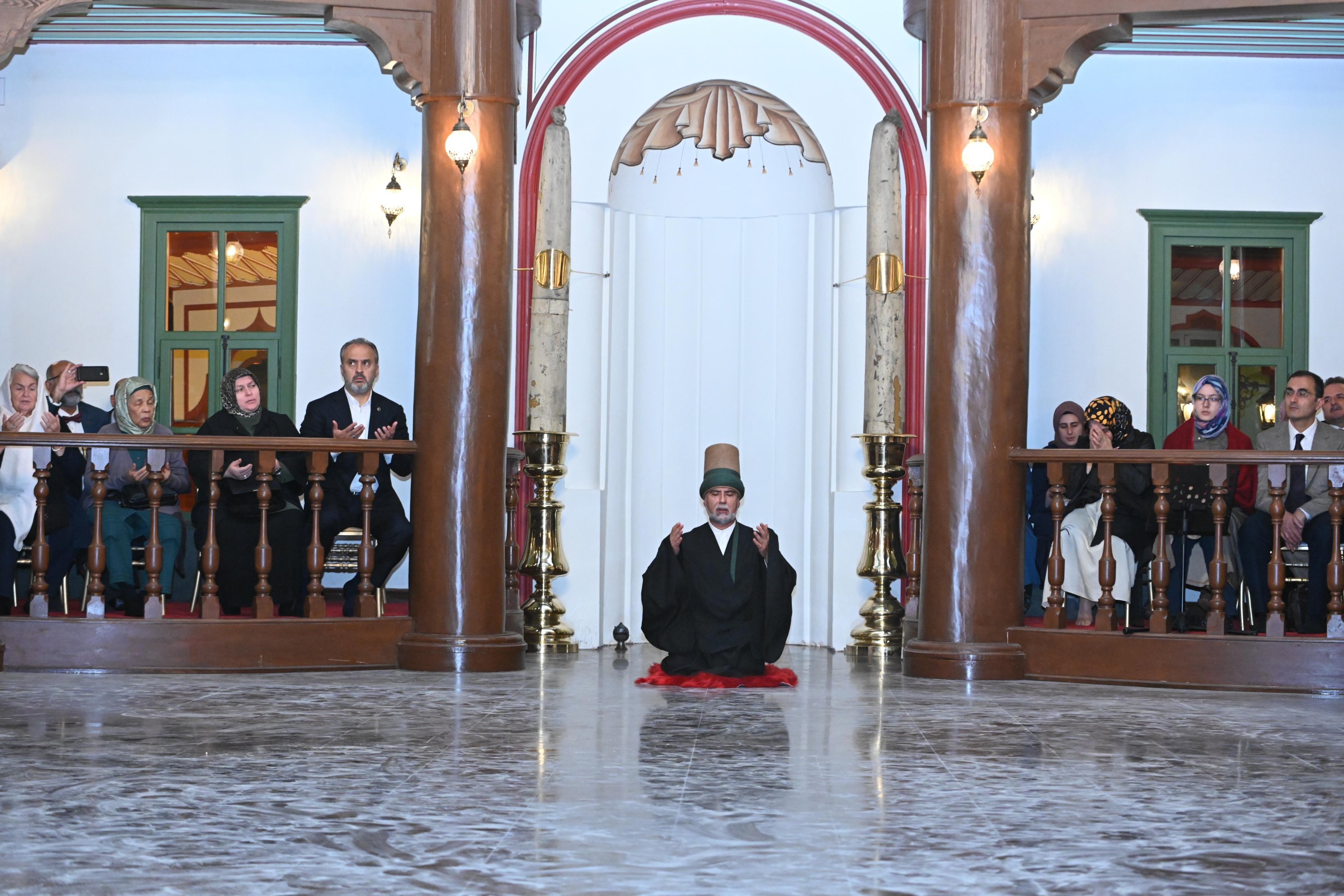© Turkuvaz Haberleşme ve Yayıncılık 2026
Founded in 1615 by Cününi Ahmed Dede under the orders of Ottoman Sultan Ahmed I, the Bursa Mevlevi Lodge, which was closed by law in 1925 and remained unused for a while, was revitalized by the Metropolitan Municipality with its original identity intact.
The ceiling decorations and wooden carvings in the semahane section, which translates to the ritual hall of the Mevlevi Lodge, are dazzling, and the matbah-ı şerif section, which translates to the kitchen where the to-be dervishes were tested, has been transformed into a museum depicting all aspects of Mevlevi Order culture. The dome inscriptions of the Bursa Mevlevi Lodge were meticulously penned by calligrapher Mahmut Şahin in the talik style, a special type of calligraphy, identical to the original.
The official opening of the Bursa Mevlevi Lodge, a new jewel in Bursa's historical treasures, was held with a ceremony attended by Culture and Tourism Minister Mehmet Nuri Ersoy.

Speaking at the opening ceremony of the Bursa Mevlevi Lodge, Bursa Metropolitan Municipality Mayor Alinur Aktaş said: "Everywhere you look in Bursa, thousands of years of history seem to come to life. As you stroll through its streets, you can hear the nevbet (military music) rising to the sky in the early days of Orhan Gazi, you encounter the admiring eyes of Evliya Çelebi, you contemplate the painting reflected in the work of Osman Hamdi Bey and you read the lines and verses praising Bursa written by Ahmet Hamdi Tanpınar. For this, preserving, protecting and passing on our historical heritage is our fundamental duty."
Giving examples of their efforts in reverence for ancestors and history, Mayor Aktaş emphasized that they realized a 40-year-old dream in the Historical Bazaar and Han District and implemented many restoration projects such as Zindan Kapı (Prison Gate), Tophane Square, Clock Tower and Iznik walls. He noted that with the support of the Ministry of Culture and Tourism, they wanted to witness Iznik's inclusion in the UNESCO Permanent List in 2024.
Culture and Tourism Minister Mehmet Nuri Ersoy, expressing that the effort to institutionalize the spiritual guidance of Mevlana Jalaluddin Rumi, one of the pioneers of universal Sufism, gave rise to the Mevlevi Order, stated that the tomb built in Konya under the approval of Rumi's son Sultan Veled and followed by Hüsameddin Çelebi not only preserved the sacred body of Rumi but also carried the distinction of being the first Mevlevi Lodge. Minister Ersoy emphasized that Mevlevi Lodges, throughout history, have influenced the spiritual lives of people from all walks of life.
"Mevlevi Order, figuratively speaking, has focused on both inner and outer beauty. Thus, its followers became virtuous individuals while also producing many artists due to the importance given to fine arts in the lodges, especially in the field of music, names like Nutki, Osman Selahaddin, Fahreddin Dede, as well as Itri, Selim III and Rauf Yekta Bey left their marks. However, this inclination should not give the impression that the Mevlevi Order is a closed structure uninvolved with the outside world," he said.
"Mevlevi Order, which fundamentally focuses on the well-being of the state and the peace of the nation, has always been sensitive to the country's survival. Whenever the state and the nation faced difficulties, especially during the 18th and 19th centuries when consecutive wars occurred, Mevlevi lodges took on the duty of social solidarity and mutual assistance. During World War I, a hospital was established in Yenikapı Mevlevi Lodge near the railway line; aid was collected in Galata Mevlevi Lodge and Mevlevi Lodges on islands like Cyprus and Crete became a refuge for persecuted Muslims, serving as a transit point to Anatolia. A volunteer regiment from the lodge fought on the Palestine front," he added.
Minister Ersoy noted that in the Mevlevi Order, the essence of the Sufi path is love, knowledge, and service. He said: "In the presence of Rumi, the holiest duty was to work; advancement in the lodge was service-oriented. While deepening the spiritual journey, daily tasks in the lodge were managed, and efforts were made to specialize in art. The Bursa Mevlevi Lodge we are in possesses all these qualities. The lodge matured the spiritual life of both the people of Bursa and those coming from outside, serving as a school in the field of fine arts as well. For four centuries, delicate work was done in areas such as sema rituals, musical practices, calligraphy, illumination, wall and ceiling decorations, and wood carving. I express my gratitude to Bursa Metropolitan Municipality, Mayor Alinur Aktaş, the working team and all the laborers, masters, and artists who contributed to this distinguished venue for their attention and care."
